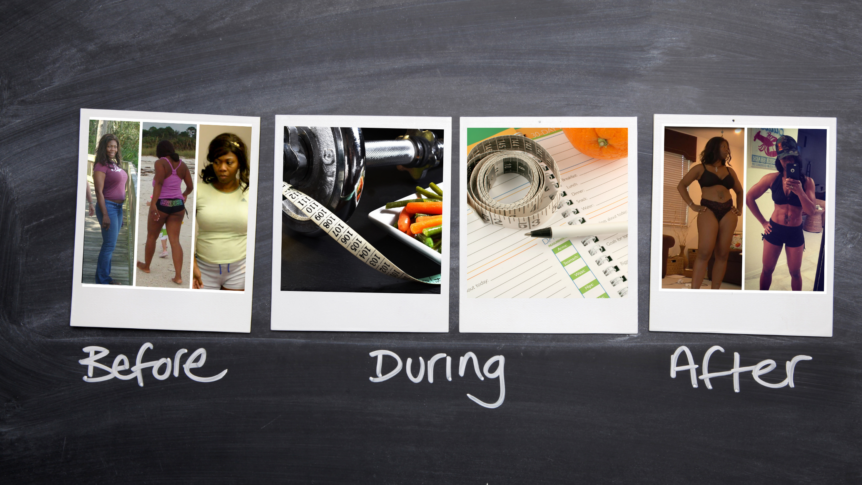Starting a new diet or fitness routine can be very exciting. We have high hopes about how much weight we will lose this time and what our lives will look like at the end of the process.
However, there are other considerations to be aware of, like —the before, during, and after of weight loss, lifestyle choices, and habit change.
It is rarely as simple as deciding that we’re going to do something and then accomplishing that goal.
And…we must also maintain it.
Before We Start
Before we start on our personal path to weight loss, or make extensive lifestyle changes, we have to begin with acknowledging that we made a lot of choices that have contributed to where we are trying to escape from.
Though many skip this step entirely, when we don’t understand how we ended up “here”, it’s highly likely that those same behaviors will bring us back to our starting point.
It’s not just that we ate too much and exercised too little. We made other choices— for a reason. Understanding our motives helps us to make different decisions when faced with the same circumstances and temptations.
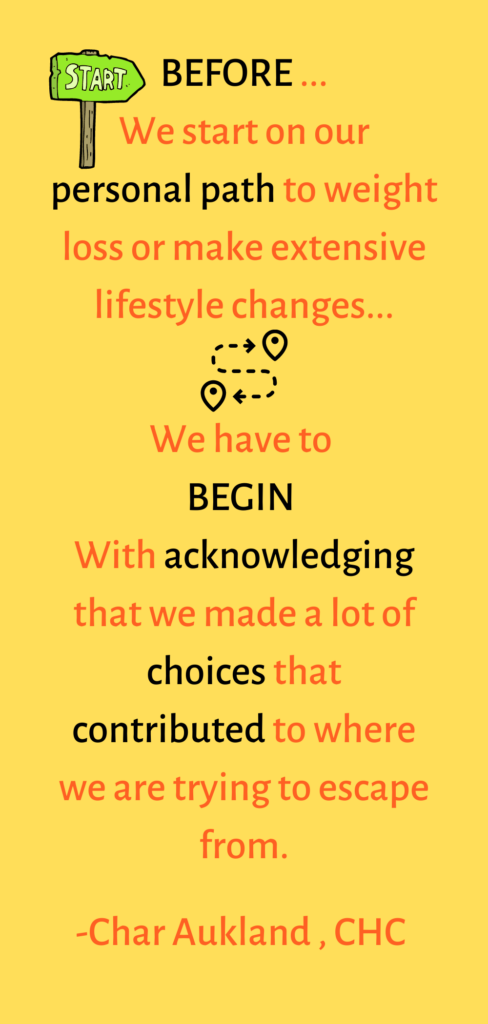
Becoming Self-aware
Self-awareness isn’t always easy. It will require some digging and may even be painful at times. But it is absolutely essential.
It is only after we recognize our role that we can begin to understand what we need to do to go in a different direction. We can start by asking:
- How long were we stuck?
- What was keeping us from moving forward?
- Why did we get to that point?
- Who do we need to be…to not go back to old habits?
Knowing the answer to these questions, beforehand, will make sure that success is more attainable.
Unfortunately, the self-awareness process tends to be overshadowed by the excitement, initial motivation, and visions of our results. And, while those things are great, they don’t address the underlying issues.
During the Weight Loss Process
If we haven’t already done the work of diving into what led to our circumstances, we will definitely be confronted in this stage.
The good news is that, in the during stage, we have a greater chance of gaining insight into the choices that led us down the current path we are trying to lead ourselves away from.
Our underlying issues become more evident when reality hits and we are faced with and forced to overcome (or be sidelined by) obstacles like old habits, poor coping skills, and the influence of our environments.
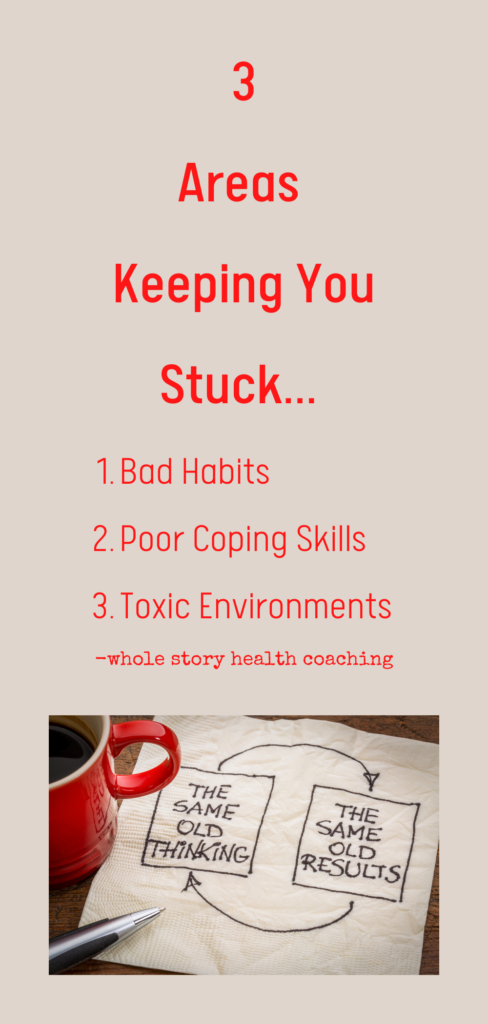
Old habits
Old habits lead us into comfort zone traps and create more problems than they solve. Still… our bad habits take time and patience to break.
As most have already experienced, ridding ourselves of destructive behaviors is tricky because they formed for a reason.
Good or bad, our habits seem to make life easier.
Automatic pilot routines like taking a shower, brushing our teeth, and getting dressed are just a few of the examples of the productive tasks we don’t think about doing.
Scrolling social media, overeating, bingeing TV, zoning out, drinking, and other methods of escape from reality are also examples of habits that we don’t have to think about doing. The difference is these can become quickly unproductive and even harmful.
Habits in this realm tend to be geared towards coping. They help us to relax , but do nothing to address our the reasons behind our reactions.
These habits are easy to go-to, hard to leave, and will keep us stuck.
Coping Behaviors
Poor coping skills work. Plain and simple. That’s why we continue to perform them. And though they may help us to deal with “life”, in the moment, they usually end up doing more harm than good.
When we continue to rely on these habits, they become difficult to break. More importantly, we don’t want to break them.
In many cases, what we’re doing is self-medicating—which quickly becomes an issue when we start to depend on the “behaviors” to help us escape… rather than eliminating or addressing the source of the problem.
So how do we know when we’re self-medicating? Here are some questions we can ask ourselves.
- What hurt could I possibly be treating?
- When I am performing this habit?
- What is triggering my behaviors?
- How am I distracting myself ?
- Am I seeking comfort in place of confronting something?
- Do I feel a sense of relief when I am engaging in this behavior?
- Can I stop for a day, a week, or longer?
As you can see, there is quite a bit of self-awareness involved in the process. Learning to become observant of our actions and when they are occurring are great starts to stopping and replacing poor coping skills.
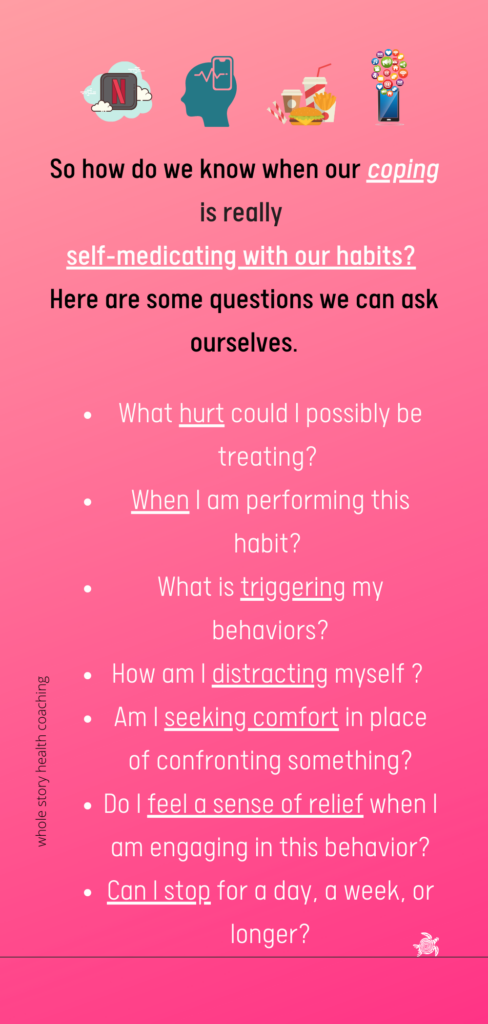
Environmental Factors
We hear a lot about earth’s environment. But how often do we think about the state of our personal environments?
These are the areas that significantly influence the choices we make and, subsequently, every aspect of our health, like our:
- cars
- homes
- neighborhoods
- churches
- workplaces
- schools
- driving routes
- friendships
- social media environments
Our environments have an effect on everything from our moods and stress levels to our eating and activity. Developing an awareness of these factors (and potential triggers) is a necessary part of achieving and maintaining our goals.
We must become active observers of our lives—which can be hard when we are used to existing on automatic pilot. But, once we open our eyes to these hidden challenges, we can take the steps toward lasting change.
For help with recognizing how your environments are weighing you down, download my free Environmental Cleanup guide.
After the Weight Comes Off
Here’s where the hard part gets harder. Losing the weight is definitely a tricky part of the journey. Keeping it off and maintaining our results is an ongoing process—beyond a 30, 60, or 90 day transformation. It’s an everyday thing.
It involves maintaining and improving the same areas we talked about above: habits, coping, and our environments.
The feelings of accomplishment from reaching our goal can give us a false sense of security. And, if we haven’t worked on the behaviors that led us to the “before” stage, we may slowly find ourselves slipping back into comfortable and deeply wired old habits.
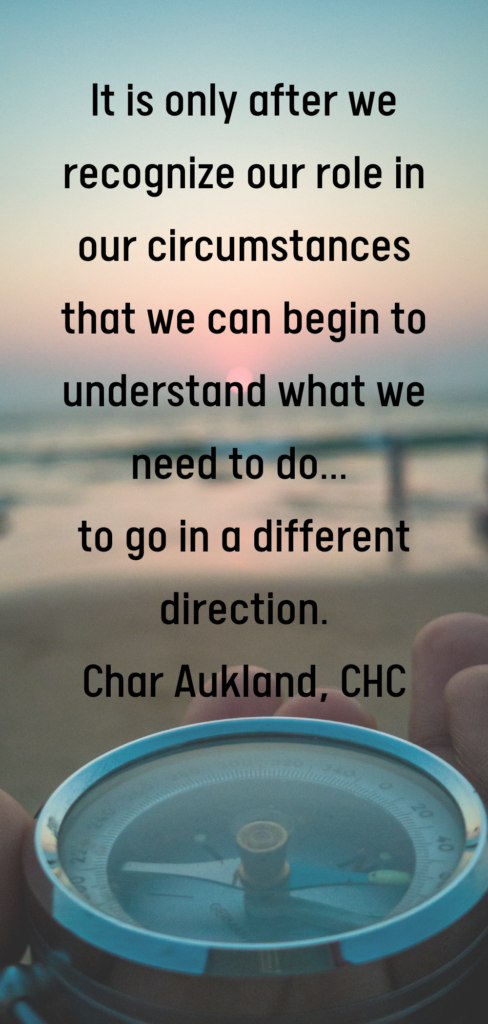
So, before you head into a new diet or fitness routine, take the time to get to know yourself, take inventory of challenges you may face, and plan accordingly —for long term success.

